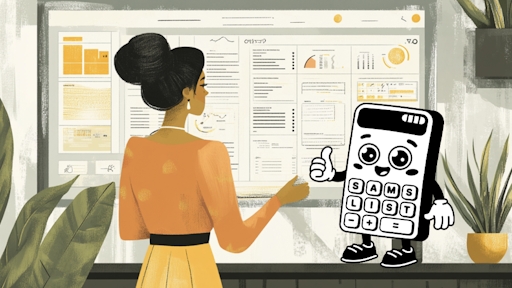How Much Does a CPA Cost for a Small Business?
Published on August 1, 2024

As a small business owner, managing your finances can be a daunting task. You may find yourself struggling to keep up with bookkeeping, taxes, and financial planning while also running your day-to-day operations. This is where acertified public accountant (CPA)can help. A CPA can providevaluable financial guidance and supportto help your business thrive. But how much does a CPA cost for a small business? Let's explore the factors that influence CPA fees and what you can expect to pay.
A certified public accountant is ahighly skilled financial professional who providesaccounting servicesto businesses and individuals. CPAs are licensed by the state and must meet rigorous education, experience, and exam requirements.
Here are a few reasons why you should consider hiring a CPA for your small business:
The cost of hiring a CPA for your small business can vary widely depending on several factors:
So, what can you expect to pay for CPA services as a small business owner? Here are some average costs based on common services:
CPAs use various fee structures when billing clients for their services. Common fee arrangements include hourly rates, flat fees, and monthly retainers. Let’s take a look at each of these:
 Choosing the right CPA is about more than just cost—it's about finding a trusted advisor who understands your business and can help you achieve your financial goals. Here are a few tips to help you get the most value from your CPA relationship:
Choosing the right CPA is about more than just cost—it's about finding a trusted advisor who understands your business and can help you achieve your financial goals. Here are a few tips to help you get the most value from your CPA relationship:
While a CPA is a good investment for any small business, it can get expensive. Here are a few ways to help you save some money on CPAs as a small business owner:
The cost of hiring a CPA for your small businessvaries based on many factors, including the size and complexity of your business, your specific accounting and tax needs, the CPA's experience, and billing structure. While professional accounting services are an investment,the right CPA can provide significant valueby helping you save on taxes, make informed financial decisions, and achieve your business goals. Finding the right CPA doesn't have to be difficult.Sam’s List connects you with experienced CPAswho can meet your unique business needs. Find your proactive CPA atsamslist.co.
Key Takeaways
- CPAs offer services liketax planning,financial statement preparation,IRS representation, andbusiness consulting, which can save time, reduce stress, and provide strategic financial guidance.
- CPAcosts vary based on location, experience, service scope, and business complexity. Higher rates are typical in larger cities or for specialized expertise. Services like tax preparation, bookkeeping, and consulting also impact overall costs.
- CPAs usehourly rates,flat fees, andmonthly retainers. Choosing the right structure depends on service needs, budget, and business complexity.Combining fee structures can optimize costsand ensure tailored financial support.
What is a CPA?
A certified public accountant is ahighly skilled financial professional who providesaccounting servicesto businesses and individuals. CPAs are licensed by the state and must meet rigorous education, experience, and exam requirements.
Why Hire a CPA for Your Small Business?
Here are a few reasons why you should consider hiring a CPA for your small business:
- Tax planning and preparation: CPAs have extensive knowledge of tax laws and regulations. They can help you navigate complex tax issues, identify deductions and credits, and ensure your business complies with all tax requirements. This can save you time, money, and stress come tax season.
- Financial statement preparation: CPAs can prepare accurate and timely financial statements, such as balance sheets, income statements, and cash flow statements. These documents provide a clear picture of your business's financial health and can be used to secure funding, attract investors, or make informed business decisions.
- IRS representation: In the event of an audit or other tax-related issue, a CPA can represent your business before the IRS. They can communicate with the IRS on your behalf, provide necessary documentation, and work to resolve any issues as quickly and favorably as possible.
- Business consulting: CPAs can offer valuable insights and advice on various business topics, from financial planning and budgeting to risk management and strategic decision-making. They can help you identify areas for improvement, set financial goals, and develop a plan to achieve them.
Factors That Affect CPA Costs for Small Businesses
The cost of hiring a CPA for your small business can vary widely depending on several factors:
Location
CPA fees can vary significantly by geographic location. In general,CPAs in larger cities or metropolitan areas tend to charge higher ratesthan those in smaller towns or rural areas. This is due to higher overhead costs, greater demand for services, and a more competitive market.Experience and Expertise
CPAs with more years of experience or specialized expertise in a particular area may charge higher fees than those with less experience or a more general focus. However,paying for a CPA with the right expertise can be a worthwhile investment, as they can provide more targeted and effective advice for your specific needs.Scope of Services
The cost of hiring a CPA will depend on the specific services you need.Basic services like tax preparation andbookkeepingare generally less expensivethan more complex services like financial statement audits or business valuation. Be sure to discuss your needs and expectations upfront to clearly understand what services are included in the CPA's fees.Business Size and Complexity
Larger businesses with more complex financial situations will generally require more time and resources from a CPA, resulting inhigher fees. Factors that can impact the complexity of your business include the number of employees, revenue, industry, and legal structure.Average CPA Costs for Small Businesses
So, what can you expect to pay for CPA services as a small business owner? Here are some average costs based on common services:
- Tax preparation: The average cost for small business tax preparation ranges from$500 to $2,500, depending on the complexity of your tax situation. This typically includes preparing and filing federal and state income tax returns and any required quarterly estimated tax payments.
- Bookkeeping: Basic bookkeeping services, such as reconciling bank statements and preparing monthly financial reports, can costbetween $500 and $2,000 per month, depending on the volume of transactions and complexity of your business.
- Financial statement preparation: The cost of preparing financial statements, such as a balance sheet or income statement,can range from $1,000 to $5,000 or more, depending on the level of detail and complexity required.
- Business consulting: CPA consulting fees can vary widely depending on the scope and complexity of the project.Hourly rates for business consulting can range from $150 to $500 or more per hour, with project-based fees ranging from a few thousand to tens of thousands of dollars.
CPA Fee Structures
CPAs use various fee structures when billing clients for their services. Common fee arrangements include hourly rates, flat fees, and monthly retainers. Let’s take a look at each of these:
Hourly Rates
Many CPAs charge by the hour, meaningyou pay for the actual time they spend working on your accounting and tax matters. Hourly rates can vary significantly depending on factors such as:- The CPA's years of experience and level of expertise
- The complexity of the work being performed
- The geographic location of the CPA's practice
Flat Fees
Some CPAs offer flat-fee pricing for specific services, such as preparing a business tax return or providing a set number of hours of consulting per month.Flat fees provide predictabilityand can be a good option if you have a well-defined project or relatively consistent ongoing needs. Flat fees for common CPA servicescan range widely depending on the scope of work and the provider. For example, fees for preparing a basic business tax return might start at a few hundred dollars, while more complex returns could cost several thousand dollars. When considering a flat-fee arrangement,make sure you understand exactly what services are included in the price. Get a detailed engagement letter outlining the scope of work, deliverables, and any additional charges that may apply.Monthly Retainers
A monthly retainer may bethe most cost-effective option if your small business requires ongoing CPA services, such as bookkeeping, financial reporting, or advisory services. With a retainer, you pay a fixed monthly fee in exchange for a set range of services. Monthly retainer feescan vary significantly based on the scope and complexity of the work. Some CPAs offer basic bookkeeping and tax packages starting at a few hundred dollars per month, while more comprehensive CFO-level services can cost several thousand dollars per month. Retainer agreementsoften include a certain number of hours of service per month, with additional hours billed at a discounted hourly rate. This can provide a good balance of predictability and flexibility as your needs change. When negotiating a retainer agreement, be sure toclearly define the services included and establish metrics for evaluating the CPA's performance. Regular check-ins and reports can help ensure you're getting value from the arrangement.Choosing the Right Fee Structure
The right fee structure for your small business will depend on factors such as:- Thenature and complexityof your accounting and tax needs.
- Thefrequency and consistencyof your service requirements.
- Yourbudget and cash flowpreferences.
- Your comfort level withvariable vs. fixed costs.
Maximizing the Value of Your CPA Relationship
Your CPA is more than just a number cruncher—they're a valuable partner in your business's success. By communicating openly, proactively seeking their advice, and viewing them as a long-term investment, you canmaximize the value of your CPA relationshipand position yoursmall business for financial success.
- Communicate regularly: Keep your CPA informed of any changes or challenges in your business throughout the year. Regular check-ins can help you stay on track and avoid surprises come tax time.
- Be proactive: Don't wait until tax season to talk to your CPA. Schedule periodic reviews to discuss your financial statements, tax planning opportunities, and any other issues affecting your business.
- Leverage their expertise: Your CPA has a wealth of knowledge and experience that extends beyond just tax and accounting. Ask for their advice on financial planning, risk management, business strategy, and other areas where they can provide valuable insights.
- Invest in the relationship: While cost is always a factor, don't let it be the only consideration when choosing a CPA. Investing in a high-quality CPA who takes the time to understand your business can pay significant dividends over the long term.
How to Save Money on CPA Services
While a CPA is a good investment for any small business, it can get expensive. Here are a few ways to help you save some money on CPAs as a small business owner:
Keep Good Records
Maintainingorganized financial records and using accounting software can helpstreamline the process and potentially lower your CPA fees.Consider Hiring a CPA for Tax Season Only
If you can't afford ongoing CPA services,consider hiring one for tax planning and preparation only. You can handle your own bookkeeping and then provide your CPA with organized records at tax time.Bundle Services
Combining multiple services with the same CPAcan often lead to discounted rates. For example, you might save money by having the same CPA handle both your tax preparation and bookkeeping.Negotiate Fees
Don't hesitate to discuss pricing with your CPA.Many CPAs are open to negotiation, especially if you are a long-term client or if you are offering a significant amount of work.Use a Monthly Retainer
If you require ongoing services,a monthly retainer can be more cost-effectivethan paying for individual services. This provides a predictable monthly expense and may include a range of services at a reduced rate.Final Thoughts
The cost of hiring a CPA for your small businessvaries based on many factors, including the size and complexity of your business, your specific accounting and tax needs, the CPA's experience, and billing structure. While professional accounting services are an investment,the right CPA can provide significant valueby helping you save on taxes, make informed financial decisions, and achieve your business goals. Finding the right CPA doesn't have to be difficult.Sam’s List connects you with experienced CPAswho can meet your unique business needs. Find your proactive CPA atsamslist.co.
Frequently Asked Questions
How much does a CPA cost per hour?
CPA hourlyrates typically range from $150 to over $400 per hour, depending on the complexity of the work, the accountant's experience, and location.Do I need a CPA for my small business?
Whilenot required, hiring a CPA can save you time, help you stay compliant with tax laws, and provide valuable financial insights to help grow your business.Comments & Questions
Sign up or log in to comment
Browse Related Articles

July 5, 2024
Understanding QSBS as a Business Owner: Navigating Tax Benefits and Eligibility Criteria
Unlock the financial benefits of Qualified Small Business Stock (QSBS) as a business owner. Learn about eligibility criteria, tax advantages, and...

January 31, 2025
How to Build a Financial Dashboard for Your Small Business
Master the process of building a financial dashboard for your small business. Get real-time insights to optimize performance and drive growth.

December 6, 2024
How to Pay Yourself From Your Business: Salary or Owner’s Draw?
How should business owners pay themselves? Find out the best methods, tax implications, and practical tips to structure your pay effectively.

Sam Parr, serial entrepreneur, is helping businesses and high net worth individuals find the perfect account. Save time and stress with tailored...
Find & Connect with Accountants, Fractional CFOs, and Financial Advisors
Company
Professional Services
Help Guides
Sam’s List is a directory for exploring accountants, bookkeepers, fractional CFOs, financial advisors, and wealth managers. We do not provide financial, investment, tax, or legal advice, nor do we recommend or endorse any specific professional. Some professionals participate in paid programs for additional visibility or leads. Users should independently verify any professional before engaging their services. Learn more in ourTerms of Service.
